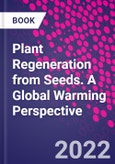Plant Regeneration from Seeds: A Global Warming Perspective comprehensively reviews the effects caused by climate change on global plant regeneration, growth and seed germination. Initial chapters discuss specific geographical regions such as steppes, the artic, boreal and alpine zones, dry and tropical forests and deserts. Subsequent chapters explore special seed-related topics like fire, soil seed banks, crops, weed emergence, and invasive species Written by leaders in the field of seed germination and plant growth, this is an essential read for researchers and academics interested in plant growth, plant regeneration, seed germination and the effects of these in relation to climate change.
Please Note: This is an On Demand product, delivery may take up to 11 working days after payment has been received.
Table of Contents
Part 1 Geographical regions1. Cold deserts of central Asia
2. Steppes
3. Arctic
4. Boreal
5. Tibet Plateau -subalpine
6. Alpine zone -Europe
7. Alpine zone South America
8. Temperate zone forests
9. Dry tropical forests
10. Tropical savannahs (incl. cerrado in Brazil)
11. Hot deserts
12. Tropical montane forests
Part 2 Special seed-related topics
13. Recalcitrant seeds (if they dry out they die)
14. Fire --- Boreal forests and Australia
15. Soil seed banks
16. Crops such as coffee and cacao
17. Timing of weed seed emergence
18. Seagrasses
19. Invasive species, especially trees
Summary chapter
Authors
Carol C. Baskin School of Biological Sciences, University of Kentucky, Lexington, USA. Over 50 years' experience in seed germination ecology, biogeography, and evolution of seed dormancy and germination. Dr Baskin has a Ph.D. in biology from Vanderbilt University and has held several teaching posts in the fields of agricultural sciences and biology in the US and Europe. Dr Baskin's current research at the University of Kentucky focuses on the life cycle and germination ecology of woody and herbaceous species of angiosperms; biology, conservation, and geographical ecology of plant taxa endemic to?cedar (limestone) glades?of unglaciated eastern United States; and plant geography?of Kentucky.She has written several publications on the subject of seed germination, most notably Seeds: Ecology, biogeography, and evolution of dormancy (Elsevier), in collaboration with her husband Dr Jerry M. Baskin. Jerry M. Baskin School of Biological Sciences, University of Kentucky, Lexington, USA. Dr Baskin received his Ph.D. from Vanderbilt University in June 1967 and after 1 year of postdoctoral work at the University of Florida joined the University of Kentucky (UK) Biology faculty in 1968. He was promoted to Full Professor in 1981and retired from UK in June 2011. Almost all of his publications are co-authored with Carol C. Baskin. He has approximately 520 journal articles plus 14 book chapters and 10 publications in symposium and conference proceedings. The first edition of "Seeds� was published in 1998 and the second edition in 2014. The book on rock outcrops and barrens (co-edited with J. Fralish and R. Anderson) was published in 1999.








